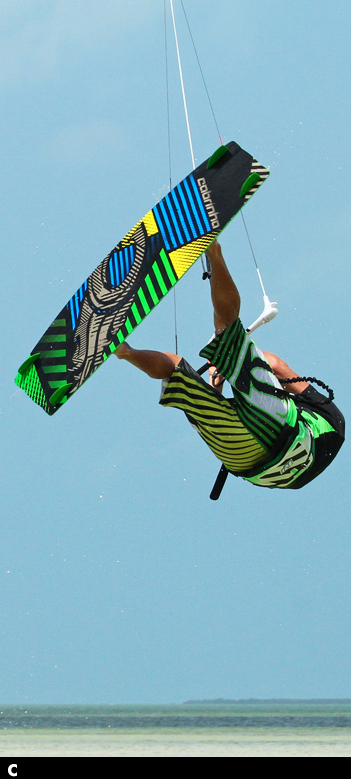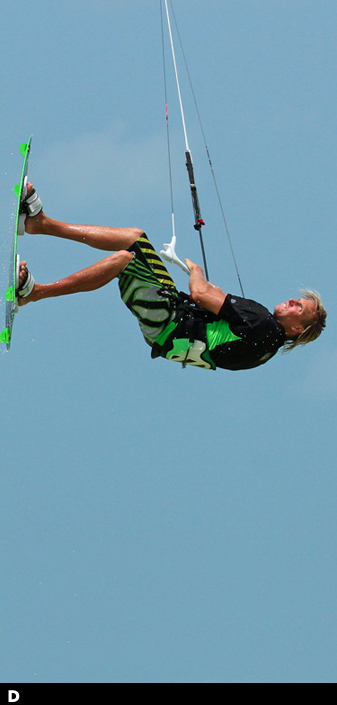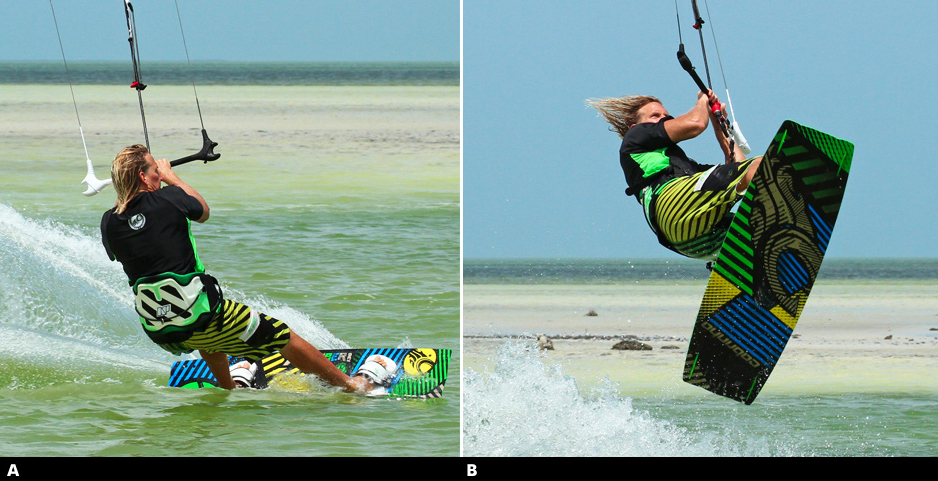KGB
The KGB is the next step on from a back to blind with an air pass. Much like the excitement of a Blind Judge 3, the add on is the final 180 of rotation so that you land heel side, therefore completing the move. It’ll have you laughing on the inside for weeks once you claim it, as that final float around to your heels is one mighty achievement. We will of course advise that you should already be stomping back to blind with air passes, as then it is more a matter of tweaking and polishing rather than learning something from scratch. If you did nail the Blind Judge Three it will help a lot, as you’ll already have built up some muscle memory to get the passing and kicking movement for the heel side landing.
- Approach and Carve Pic A.
In order to get the height, pop and slow enough rotation your entry into the KGB must be bang on. First off make sure you come in well off the wind, so bear away a lot before unhooking. Why? This will let you carve hard enough to get your rotation into the back loop without turning too far into wind, and therefore you’ll actually “do” more of the back loop in the air, and thus it will feel slower, giving you more chance to pass and turn. Secondly make sure you lean back towards the tail of the board as you bear away. You can see in the pit that the rider’s hips are leaning back over his back foot, and his shoulders are leaning back towards the tail of the board. This will help him invert, which in turn will make the pass both easier and closer so that he can pass later and therefore get all the way around to his heels. Finally don’t be afraid to have your kite a tad higher for learning this, as it’ll be more pleasant and confidence boosting knowing that there’s enough room to complete the manoeuvre.
- The Take Off Pic B.
Once you’ve got off the water with a right royal stamp against the back foot your aim is to get the board swinging up whilst you turn slowly through your rotation until you just about complete a back loop – but with the board up high and the bar in close. Here the rider has kept his hands in close to his waist from the off by locking his elbows in, and thus hopefully the bar will stay nice and close too and he won’t need superhuman strength to pass the bar. The rider’s head, although just about leading the rotation, is not looking over his front shoulder, but rather forward, perpendicular to his shoulders. This prevents him from spinning too quickly, thus helping him to turn the other way when needed and pass. Finally as his shoulders are still leaning back from the take off and his board rises the rider and brings his knees up and close, so that the board moves with him and doesn’t pull him down later in the move.
- The Inversion Pic C.
Getting the board up is what gives you time to pass the bar late and get your front foot through.
The timing and amount you turn can vary, but the more you complete the back rotation the better your KGB will look, much the same as a back to blind. The rider is coming around his back loop, not quite a full 360, but almost in relation to the angle he went off the wind to start, which gives him the most chance of landing comfortably downwind and not on an edge. Your aim is to get to this point with your board high and the bar still tucked in close to your hips. The further you come around the more your hips will come up towards the bar and save you having to pull your weight up to the bar, and this way you can rotate the opposite way for the pass without getting pulled backwards. Like many passes you will think you’ve left it too late, but this is your cue to go.
- Turn The Other Cheek Pk D.
Time to pull the trigger! Once you’ve completed the back loop you need to go for the pass before your board and legs drop and therefore pull you down and away from the bar. With two hands still holding the bar, The rider keeps his knees in and up whilst he turns his head to initiate the pass. The head should lead the entire move from here; if it does you can turn and claim the KGB. As you turn your head look up, not down at the water. The fact that the board and his feet have completed the back loop mean that the board is in front of him and therefore he won’t get pulled backwards away from the board but rather drop forwards towards it. This is not a bad time to give the kite a quick tweak down if you find that it keeps rising.
 However if you keep your elbows in your kite will naturally dip once you release your back hand, as all your weight will transfer to the front. The MAIN DIFFERENCE here to a back to blind with air pass, is that your focus is not on passing the bar but rather on spinning your head, body and board so that you can see where you’ll land. If you just concentrate on the pass you’ll drop down without turning the full 360 to heel side.
However if you keep your elbows in your kite will naturally dip once you release your back hand, as all your weight will transfer to the front. The MAIN DIFFERENCE here to a back to blind with air pass, is that your focus is not on passing the bar but rather on spinning your head, body and board so that you can see where you’ll land. If you just concentrate on the pass you’ll drop down without turning the full 360 to heel side.
- Forward Pass Pic E.
Looking forward to where you want to go will make you lead the rotation, so stretch your chin out in front of you and keep your eyes up. Normally you would turn your head down, and therefore pass but then drop down. In a KGB you must keep the head looking above the water, searching for where you’ll land. Here you can see the result – The rider is still turning as his head and body are leading the way. As the rider turns he rotates onto the bar and can therefore pass, but the priority is the rotation and therefore the pass from one hand to the other is late. Finally if you look at Christian’s front leg you can see that it is still bent. Keeping your landing foot close will guarantee that it comes with you and doesn’t get left behind. Once you get this far, prepare to scream and celebrate, as the KGB will be yours.
Top Tips
- The foundation for this move is a decent slow and inverted back loop, so repeat as many of these as you can, getting the board high and finishing your rotation at the apex.
- This will get you prepared and visually ready for the final 360. If your feet are dropping as you come around your back loop, you need more inversion, so more leaning back, more locked elbows and more knees up.
- We won’t be adding any common problems for this move, as it is a matter of concentrating on the relevant skills and putting them together – an inverted slow back loop, and a pass rotation lead by you head held high.
Keystones
- Massively off the wind
- Lean back towards the tail
- Hands in, knees up
- Full rotation to inverted position.
- Lead the pass with your head held high and front knee in.

